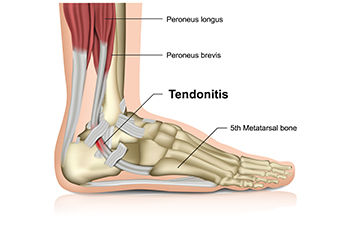
Achilles tendonitis is an inflammation of the Achilles tendon, the band connecting the calf muscles to the heel bone. This condition often arises from overuse, such as repetitive stress from activities like running or jumping. It can also result from a sudden increase in exercise intensity, wearing poor footwear, or tight calf muscles. Symptoms can include pain and stiffness along the tendon, especially in the morning or after physical activity. Relief options focus on reducing inflammation and promoting healing. Resting the affected foot can alleviate pain and swelling. Taking anti-inflammatory medications can also help to provide additional relief. Gentle stretching and strengthening exercises may restore flexibility and prevent future issues. Additionally, wearing supportive footwear and orthotics can also aid recovery. If you have pain in your heel and calf area, it is suggested that you consult a podiatrist who can accurately diagnose and treat an Achilles tendon injury.
Achilles tendon injuries need immediate attention to avoid future complications. If you have any concerns, contact Dr. Lubrina Bryant of District Podiatry, PLLC. Our doctor can provide the care you need to keep you pain-free and on your feet.
What Is the Achilles Tendon?
The Achilles tendon is a tendon that connects the lower leg muscles and calf to the heel of the foot. It is the strongest tendon in the human body and is essential for making movement possible. Because this tendon is such an integral part of the body, any injuries to it can create immense difficulties and should immediately be presented to a doctor.
What Are the Symptoms of an Achilles Tendon Injury?
There are various types of injuries that can affect the Achilles tendon. The two most common injuries are Achilles tendinitis and ruptures of the tendon.
Achilles Tendinitis Symptoms
Rupture Symptoms
Treatment and Prevention
Achilles tendon injuries are diagnosed by a thorough physical evaluation, which can include an MRI. Treatment involves rest, physical therapy, and in some cases, surgery. However, various preventative measures can be taken to avoid these injuries, such as:
If you have any questions please feel free to contact our office located in Washington, D.C . We offer the newest diagnostic tools and technology to treat your foot and ankle needs.